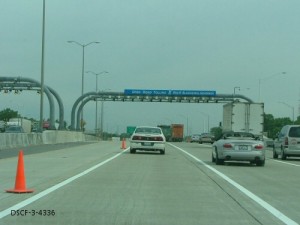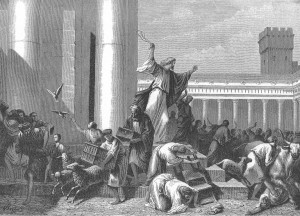When the local toll roads were first built in the 1950’s, their promise was that all toll booths would be removed after the highway was paid for, about 3 years. Fifty-three years later, we’re still paying.
In the early days of driving the toll road, we received a card when we got on and then turned it in when we got off. Our toll was calculated from the card. Eventually that system was replaced with a cash-as-you-go payment, starting at 25 cents per toll. We had to stop every 30 miles or so to throw change into a plastic bin before continuing.
Now, of course, we have “open road tolling” which means the toll road can take our money without us stopping to give it to them. When Nate and I used to drive the toll road between Illinois and Michigan, he’d often complain about the highway authority going back on its word to upgrade the road into a freeway, once a certain amount had been collected. Quite a few people felt that way, expressing their opinions in law suits and citizen groups established to put pressure on the powers-that-be. But today we’re still paying.
Keeping our word is important. It’s a character quality seen less and less these days and runs rampant in the political world with unmet campaign promises. But the most important place to keep our word is in one-on-one relationships such as husband-and-wife, parent-and-child, friend-and-friend. If I was given the chance to do one thing differently in my past, it would be to keep my word better, to do exactly what I said I would do.
If I told Nate, “I’ll pick you up at the train at 6:35,” I’d be there waiting for him rather than allowing him to wait for me. If I told the kids, “Don’t do that again or you’ll get a spanking,” I’d follow through.
It’s especially important to keep our word when we tell someone we won’t share a confidence with anyone else. If we violate that, our word becomes worthless, not to mention the damage we do to that person and our relationship with him or her.
I’ve asked myself, “What would the Christian life be like if God acted like I did and didn’t keep his word?” He’s told us that he does everything he says he’ll do, and Scripture backs that up. He’s kept his promises in my own life, and I’ve seen him do it in others’. Because I’ve experienced failure at always keeping my word, I’m doubly appreciative that I can count on him to keep his. After all, his has eternal consequences, and I’m trusting him 100%.
Driving the toll roads is a helpful reminder that I want to be trusted to keep my word. And maybe in the long run, the toll road will make good on its promise, too. The latest word is that it’ll be paid for in 2034. If I still have a driver’s license at 89, you’ll find me driving the freeway.
“Set a guard over my mouth, Lord; keep watch over the door of my lips.” (Psalm 141:3)





